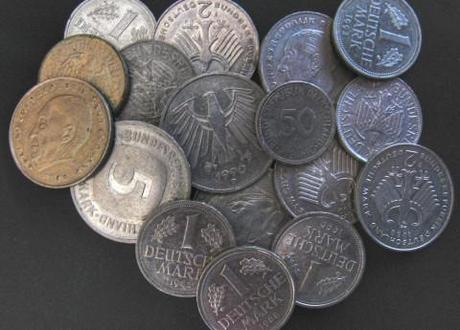
The deutschmark. Photo credit: Markusram, http://www.flickr.com/photos/markusram/
On November 17, 2011 a man named Richard Medley passed away after a brief illness. Few today will remember Mr. Medley, but in his capacity as chief political advisor to hedge fund titan George Soros, he played a central role in what was possibly the most infamous episode in European Union economic relations until the current crisis.
In September 1992, Medley was the crucial conduit between Soros and the German Bundesbank. It was he that apparently advised his boss that the Bundesbank secretly supported his attack on sterling, but would not allow an attack on the French franc. As Soros later explained in an interview with The Times: “I felt safe betting with the Bundesbank. The Bundesbank clearly wanted the pound and lira devalued, but it was prepared to defend the French franc. I did better than some others by sticking to the Bundesbank’s side.” Reportedly, the devaluation of sterling on ‘black Wednesday’ earned George Soros US$ 1 billion.
The Exchange Rate Mechanism (ERM) crisis of 1992 is very relevant to today’s debt crisis because it illustrates the lengths to which the independent German Bundesbank will go to fight inflation. The European Monetary System (EMS) set up in 1979 between eight European Community member countries was the second attempt at European monetary coordination following an earlier, unsuccessful attempt in 1972.
Then, as now, the German economy was at the heart of Europe. When Bundesbank President Helmut Schlesinger was asked why he disliked the ‘ecu’, he reportedly remarked that the only thing he disliked was the name; it should have been called the deutsche mark. And in effect, that is what the ERM was, an attempt by the EC to create stability by having the currencies of the other countries trade in a narrow 2.25 percent band around the ‘ecu’, which was effectively anchored by the deutschemark, while Germany’s interest rate became the ‘base rate’ for the EC . However, for currency values to remain aligned, the monetary policies of the various member countries would also have to agree; in effect, Europe would have to act as one.
After initially staying out of the ERM under Margaret Thatcher, the UK joined in 1990 under John Major’s government. However, Britain was in a deep recession at the time, and needed low interest rates in order to try and stimulate economic growth. Conversely, the massive pumping of money into East Germany, following German reunification was creating inflationary pressures in Germany. Given the choice between supporting the ERM or following a ‘beggar thy neighbour’ monetary policy, the Bundesbank acted in their own narrow interest. Schlesinger, angered by public calls from the then Chancellor of the Exchequer Norman Lamont for the easing of German monetary policy, publicly retaliated, stating that Britain would have to abandon its commitment to the ERM and devalue sterling. This “slip of the tongue” was of course nothing of the kind. It triggered the speculative attack on the pound by Soros and others that quickly led to black Wednesday.
Despite the failure of the ERM in 1992, today we have the ECB and the Euro. However, we also have an even worse crisis. The UK has stayed out of it this time, but being locked into a currency union with Germany has caused the less competitive countries of southern Europe to borrow unsustainably, while Germany’s economy has gone from strength to strength. Germany has once again been following ‘beggar thy neighbour’ policies, and now that the neighbours desperately need the ECB to bail them out by issuing Eurobonds (effectively ‘printing money’), the old German terror of inflation has once again surfaced to block any plans to do so. It is imperative that the Germans once again put their monetary conservatism aside for the greater good, and increase the money supply as they did for their East German cousins in 1990, but other historical precedents a couple of years later do not make this seem likely.

